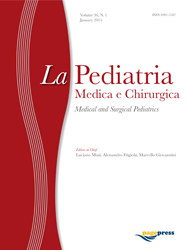Does colostrum play a role in intestinal adaptation? A systematic review of literature
All claims expressed in this article are solely those of the authors and do not necessarily represent those of their affiliated organizations, or those of the publisher, the editors and the reviewers. Any product that may be evaluated in this article or claim that may be made by its manufacturer is not guaranteed or endorsed by the publisher.
Authors
Colostrum is a source of growth factors and nutrients aiding newborns in adaptation to extrauterine life. Its clinical use has been investigated as an immunological component to protect, especially preterm newborns, from early infectious complications. This article aims to investigate the current knowledge about the value of colostrum in enhancing mechanisms of intestinal adaptation in patients affected by Short Bowel Syndrome (SBS). A MEDLINE systematic search was conducted. Inclusion criteria were English language and post-operative colostrum administration in animals and humans undergoing bowel resection. From a total of 734, 10 full-text articles were included: 5 studies on animal models, 4 on humans affected by SBS, and 1 study on animal and paediatric populations. Intestinal adaptation was investigated through diverse clinical, morphological, and functional parameters. No clear benefits of colostrum were reported in both populations. Paucity of trials, limited study duration, and heterogeneous conditions led to poorly standardized results. Colostrum tolerability is an encouraging result, but the outcome of colostrum clinical use in short bowel has still to be determined. Further investigations are required to safely promote use of colostrum in nutritional programs. Standard parameters of intestinal adaptation would be required to evaluate the possible role of colostrum in the process.
How to Cite

This work is licensed under a Creative Commons Attribution-NonCommercial 4.0 International License.






